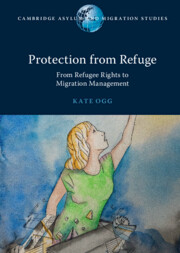Book contents
- Protection from Refuge
- Cambridge Asylum and Migration Studies
- Protection from Refuge
- Copyright page
- Dedication
- Contents
- Preface
- Acknowledgements
- Abbreviations
- 1 Journeys in Search of Refuge
- 2 Refuge as a Concept and a Place
- 3 Using Human and Refugee Rights to Resist Encampment
- 4 Using Human Rights Law to Travel in Search of Refuge in Europe
- 5 Direct Challenges to Regional Containment Instruments
- 6 Seeking Refuge as a Palestinian Refugee
- 7 Resisting the Prospect of Refuge in an IDP Camp
- 8 Elusive Refuge
- Index
3 - Using Human and Refugee Rights to Resist Encampment
Published online by Cambridge University Press: 17 March 2022
- Protection from Refuge
- Cambridge Asylum and Migration Studies
- Protection from Refuge
- Copyright page
- Dedication
- Contents
- Preface
- Acknowledgements
- Abbreviations
- 1 Journeys in Search of Refuge
- 2 Refuge as a Concept and a Place
- 3 Using Human and Refugee Rights to Resist Encampment
- 4 Using Human Rights Law to Travel in Search of Refuge in Europe
- 5 Direct Challenges to Regional Containment Instruments
- 6 Seeking Refuge as a Palestinian Refugee
- 7 Resisting the Prospect of Refuge in an IDP Camp
- 8 Elusive Refuge
- Index
Summary
This chapter examines forced encampment litigation in Kenya. Refugees living in urban areas resisting facing the prospect of relocation to a refugee camp, as well as refugees living in camps seeking permission to leave have initiated these cases. I examine how judges use human rights in the Kenyan Constitution and rights in the Refugee Convention as prisms to articulate the functions and nature of refuge. I show that Kenyan courts have understood refuge as a process as well as a human rights remedy that must allow refugees to live a liveable life in the present, have hope for the future and heal from past trauma. Judges arrive at these sophisticated understandings of refuge when they identify and reflect on irreducible aspects of refugeehood. However, in more recent cases, Kenyan judges instead focus on the uniqueness of the protection from refuge litigant. This results in conceptualising refuge as a limited commodity that, akin to welfare, must be given to those most in need or most deserving. Nevertheless, a feminist analysis indicates that in identifying the anomalous refugee, Kenyan courts have addressed protection concerns relating to gender, age and disability in a sensitive and nuanced manner.
Keywords
- Type
- Chapter
- Information
- Protection from RefugeFrom Refugee Rights to Migration Management, pp. 56 - 78Publisher: Cambridge University PressPrint publication year: 2022



